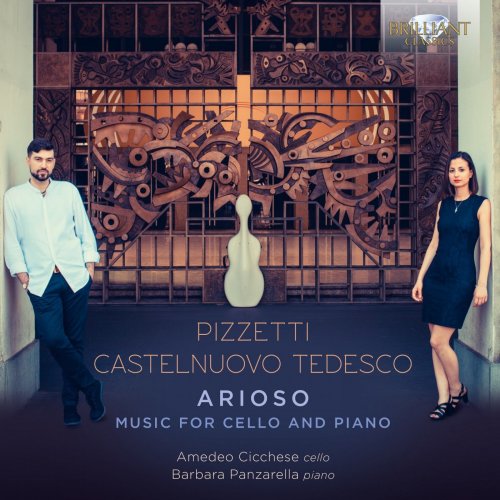
Barbara Panzarella & Amedeo Cicchese - Pizzetti & Castelnuovo Tedesco: Arioso (2019)
BAND/ARTIST: Barbara Panzarella, Amedeo Cicchese
- Title: Pizzetti & Castelnuovo Tedesco: Arioso
- Year Of Release: 2019
- Label: Brilliant Classics
- Genre: Classical
- Quality: flac lossless
- Total Time: 01:08:46
- Total Size: 270 mb
- WebSite: Album Preview
Tracklist
---------
01. 3 Canti: I. Affettuoso
02. 3 Canti: II. Quasi grave e commosso
03. 3 Canti: III. Appassionato
04. Sonata in F Major: I. Largo
05. Sonata in F Major: II. Molto concitato e angoscioso
06. Sonata in F Major: III. Stanco e triste-Largo
07. Sonata, Op. 50: I. Arioso e sereno
08. Sonata, Op. 50: II. Arietta con variazioni-Allegretto, grazioso e un poco malinconico
09. Sonata, Op. 50: III. Vivacemente
10. Sonata, Op. 50: IV. Dolente ma con fierezza
11. Sonata, Op. 50: V. Rustico
12. Sonata, Op. 50: VI. Largo e pomposo
13. Sonata, Op. 50: VII. Energico e ben ritmato
14. Figaro Fantasy on "Il barbiere di Siviglia"
Any cellist seeking new repertoire, and any listener in search of Romantic cello sonatas beyond Brahms, will alight upon this album with enthusiasm. Although Mario Castelnuovo-Tedesco (1895-1968) studied under Ildebrando Pizzetti (1880-1968) at the Conservatoire in Florence during the early years of the 20th century, their paths diverged when the Jewish Castelnuovo-Tedesco had to emigrate to the US in 1938. Back in 1921 Pizzetti had composed a Cello Sonata thematically unified across its three movements, with an ‘agitated and anguished’ Scherzo at its heart, while the slow outer movements translate elements of medieval chant and polyphony into soulful meditations. Three years later he composed a cycle of Tre Canti – three songs more commonly encountered in the version for violin and piano but better suited to the pitch and expressive range of the cello, so closely molded to that of the human voice. And these really are ‘songs without words’ – by turns affectionate, tender and impassioned. The younger Castelnuovo-Tedesco was more concerned to establish a mood than to tell a story in his instrumental music, and the first movement of his Cello Sonata from 1928 is an object example of his tendency to face both backwards and forwards, artistically speaking, so that he can evoke Romanticism while simultaneously casting doubt upon its certainties and view them from an anxious distance. The album is rounded off with the delicious fantasy on the Largo al factotum and ‘Un voce po’ fa’ from Il barbiere di Siviglia which Castelnuovo-Tedesco composed in two versions, for Jascha Heifetz and Gregor Piatigorsky, having emigrated and become a fixture on the Hollywood musical scene.
---------
01. 3 Canti: I. Affettuoso
02. 3 Canti: II. Quasi grave e commosso
03. 3 Canti: III. Appassionato
04. Sonata in F Major: I. Largo
05. Sonata in F Major: II. Molto concitato e angoscioso
06. Sonata in F Major: III. Stanco e triste-Largo
07. Sonata, Op. 50: I. Arioso e sereno
08. Sonata, Op. 50: II. Arietta con variazioni-Allegretto, grazioso e un poco malinconico
09. Sonata, Op. 50: III. Vivacemente
10. Sonata, Op. 50: IV. Dolente ma con fierezza
11. Sonata, Op. 50: V. Rustico
12. Sonata, Op. 50: VI. Largo e pomposo
13. Sonata, Op. 50: VII. Energico e ben ritmato
14. Figaro Fantasy on "Il barbiere di Siviglia"
Any cellist seeking new repertoire, and any listener in search of Romantic cello sonatas beyond Brahms, will alight upon this album with enthusiasm. Although Mario Castelnuovo-Tedesco (1895-1968) studied under Ildebrando Pizzetti (1880-1968) at the Conservatoire in Florence during the early years of the 20th century, their paths diverged when the Jewish Castelnuovo-Tedesco had to emigrate to the US in 1938. Back in 1921 Pizzetti had composed a Cello Sonata thematically unified across its three movements, with an ‘agitated and anguished’ Scherzo at its heart, while the slow outer movements translate elements of medieval chant and polyphony into soulful meditations. Three years later he composed a cycle of Tre Canti – three songs more commonly encountered in the version for violin and piano but better suited to the pitch and expressive range of the cello, so closely molded to that of the human voice. And these really are ‘songs without words’ – by turns affectionate, tender and impassioned. The younger Castelnuovo-Tedesco was more concerned to establish a mood than to tell a story in his instrumental music, and the first movement of his Cello Sonata from 1928 is an object example of his tendency to face both backwards and forwards, artistically speaking, so that he can evoke Romanticism while simultaneously casting doubt upon its certainties and view them from an anxious distance. The album is rounded off with the delicious fantasy on the Largo al factotum and ‘Un voce po’ fa’ from Il barbiere di Siviglia which Castelnuovo-Tedesco composed in two versions, for Jascha Heifetz and Gregor Piatigorsky, having emigrated and become a fixture on the Hollywood musical scene.
Year 2019 | Classical | FLAC / APE
As a ISRA.CLOUD's PREMIUM member you will have the following benefits:
- Unlimited high speed downloads
- Download directly without waiting time
- Unlimited parallel downloads
- Support for download accelerators
- No advertising
- Resume broken downloads


